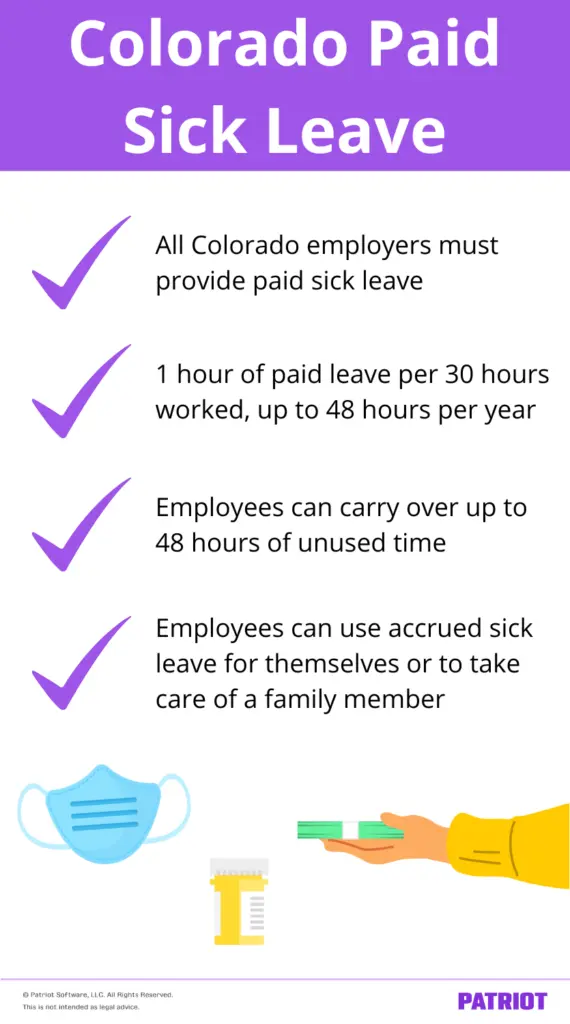A number of states, including Colorado, have hopped on the paid sick leave bandwagon. Learn the ins and outs of the Colorado paid sick leave law, including how it works and accrual rates.
Paid sick leave overview
So, what exactly is paid sick leave? Paid sick leave is time off an employee can take if they or a family member is sick.
The states with paid sick leave determine what qualifies for time off. This typically includes time off for physical or mental illness, injury, preventative care, and other health conditions. Some states may also let employees use paid sick leave for services after domestic violence, stalking, etc.
Paid sick leave laws vary by state. However, the laws typically include rules for which employers need to follow the law, what employees can use time off for, accrued time off rates, and maximum accrual limits.
Colorado paid sick leave: FAQs
If you’re an employer in Colorado, you need to know all about accrued paid sick leave to stay compliant. Get to know everything about the law by checking out some frequently asked questions below.
What is it?
The Colorado Healthy Families and Workplaces Act (HFWA) requires Colorado employers to provide paid sick leave to qualified employees.
Employers must pay employees at the same pay rate the employee would earn if they were working. And employers can’t count an employee’s sick leave as absences.
How much Colorado sick leave can an employee accrue?
Under Colorado’s sick leave law, employers must provide one hour of paid leave per 30 hours worked, up to 48 hours per year.
Employers can offer a more generous paid sick leave policy (e.g., 1.5 hours for every 30 worked). But they must at least follow the state’s minimum requirement.
What can accrued leave be used for?
Employees can use accrued sick leave for the following reasons:
- Mental or physical illness, injury, or health condition that prevents work (self or family member)
- Preventative care or diagnosis, care, or treatment of health conditions (self or family member)
- Domestic violence, sexual abuse, or criminal harassment (self or family member)
- Workplace closure or the closure of a school or place of care of a child during a public health emergency
- Bereavement, financial needs, or legal needs after a death of a family member
- Power, heat, or water loss (or another unexpected event) due to inclement weather that causes the employee to evacuate their residence or care for a family member whose school or place of care is closed
A family member is an immediate family member who is related by blood, marriage, civil union, or adoption. Family members also include a child or person the employee stood in loco parentis for and any person the employee provides health- or safety-related care for.
Which employers does the law apply to?
All Colorado employers must follow the Colorado paid sick leave law.
As of January 2022, small and large employers have the same accrued leave responsibilities. Before 2022, certain employers were exempt from the paid sick leave law.
Can employees carry over accrued sick leave?
Employees can carry over up to 48 hours of unused paid sick leave to the next year.

Do PTO policies and CBAs count for sick leave?
Paid leave in paid time off (PTO) policies or collective bargaining agreements (CBAs) can satisfy HFWA requirements. However, the policy or agreement must cover all the same conditions or needs and have the same pay rate.
Can employers require documentation?
Employers can require employees to provide documentation for accrued paid sick leave for absences of four or more consecutive days. Employees who must provide documentation can provide it after the leave ends.
Where can you find additional information?
For more information, check out the following resources:
Colorado sick leave law: Fast facts
As a Colorado employer, you need to stay compliant with the Colorado HFWA. To help stay on top of your paid sick leave responsibilities, check out these fast facts:
- All Colorado employers must follow paid sick leave laws, regardless of size or industry
- Employers must provide one hour of paid leave per 30 hours worked, up to 48 hours per year
- Employees can carry over up to 48 hours of unused accrued paid sick leave to the next year
- Employees can use accrued sick leave for themselves or to take care of a family member
- Qualified reasons for paid sick leave include mental or physical illnesses, injuries, and health conditions that prevent work; preventative care; vaccinations; diagnosis, care, or treatment of health conditions; treatments related to domestic violence, sexual abuse, or criminal harassment; workplace or school closures; bereavement; and inclement weather
Need an easy way to keep track of employee wages, accrued time off, payroll taxes, and more? Patriot’s online payroll makes paying employees a breeze. And, our expert (and free) USA-based support is there to help you every step of the way. Try it for free today!
This article has been updated from its original publication date of March 1, 2023.
This is not intended as legal advice; for more information, please click here.






